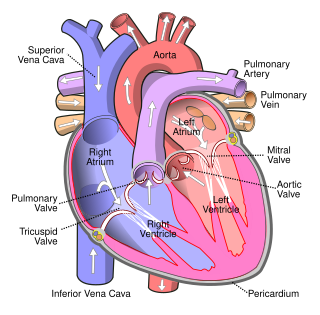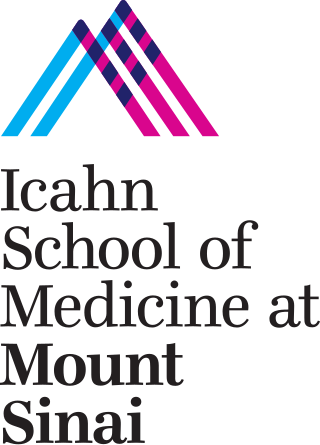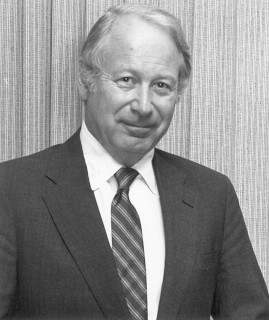
A pulmonary artery is an artery in the pulmonary circulation that carries deoxygenated blood from the right side of the heart to the lungs. The largest pulmonary artery is the main pulmonary artery or pulmonary trunk from the heart, and the smallest ones are the arterioles, which lead to the capillaries that surround the pulmonary alveoli.
The NewYork-Presbyterian Hospital is a nonprofit academic medical center in New York City affiliated with two Ivy League medical schools, Cornell University and Columbia University. The hospital comprises seven distinct campuses located in the New York metropolitan area. The hospital's two flagship medical centers are Columbia University Irving Medical Center and Weill Cornell Medical Center, situated on opposite sides of Upper Manhattan.

The Icahn School of Medicine at Mount Sinai, formerly the Mount Sinai School of Medicine, is a private medical school in New York City, New York, United States. The school is the academic teaching arm of the Mount Sinai Health System, which manages eight hospital campuses in the New York metropolitan area, including Mount Sinai Hospital and the New York Eye and Ear Infirmary.
The intra-aortic balloon pump (IABP) is a mechanical device that increases myocardial oxygen perfusion and indirectly increases cardiac output through afterload reduction. It consists of a cylindrical polyurethane balloon that sits in the aorta, approximately 2 centimeters (0.79 in) from the left subclavian artery. The balloon inflates and deflates via counter pulsation, meaning it actively deflates in systole and inflates in diastole. Systolic deflation decreases afterload through a vacuum effect and indirectly increases forward flow from the heart. Diastolic inflation increases blood flow to the coronary arteries via retrograde flow. These actions combine to decrease myocardial oxygen demand and increase myocardial oxygen supply.

The Joan & Sanford I. Weill Medical College of Cornell University is Cornell University's biomedical research unit and medical school in New York City. It is affiliated with NewYork-Presbyterian Hospital, Weill Cornell Medical Center, Hospital for Special Surgery, Memorial Sloan Kettering Cancer Center, and Rockefeller University, all of which are located on or near York Avenue and Sutton Place.

The Lewis Katz School of Medicine at Temple University (LKSOM), located on the Health Science Campus of Temple University in Philadelphia, Pennsylvania. It is one of seven schools of medicine in Pennsylvania that confers the Doctor of Medicine degree. It also confers Ph.D and M.S. degrees in biomedical science, and offers a Narrative Medicine program.
A coronary CT calcium scan is a computed tomography (CT) scan of the heart for the assessment of severity of coronary artery disease. Specifically, it looks for calcium deposits in atherosclerotic plaques in the coronary arteries that can narrow arteries and increase the risk of heart attack. These plaques are the cause of most heart attacks, and become calcified as they mature. These calcifications can then be detected by CT because of their high attenuation. This severity can be presented as an Agatston score or coronary artery calcium (CAC) score. The CAC score is an independent marker of risk for cardiac events, cardiac mortality, and all-cause mortality. In addition, it provides additional prognostic information to other cardiovascular risk markers. Obstructions may be present even with an Agatston score of zero, especially in younger patients. A typical coronary CT calcium scan is done without the use of radiocontrast, but it can possibly be done from contrast-enhanced images as well, such as in coronary CT angiography. The exam is best performed with cardiac gating to eliminate motion but can also be estimated in the presence of motion.

Valentín Fuster Carulla, 1st Marquess of Fuster is a Spanish cardiologist and aristocrat.

Coronary CT angiography is the use of computed tomography (CT) angiography to assess the coronary arteries of the heart. The patient receives an intravenous injection of radiocontrast and then the heart is scanned using a high speed CT scanner, allowing physicians to assess the extent of occlusion in the coronary arteries, usually in order to diagnose coronary artery disease.
Jean-Claude Tardif is the Director of the Research Center at the Montreal Heart Institute and Professor of Medicine at the University of Montreal. He received his medical degree (MD) in 1987 from the University of Montreal and specialized in cardiology and research in Montreal and Boston until 1994. Dr. Tardif holds the Canada Research Chair in personalized medicine and the University of Montreal endowed research chair in atherosclerosis. He is also the Scientific Director of the Montreal Health Innovations Coordinating Center (MHICC).

James S. Forrester III is an American cardiologist. Born in Philadelphia, Pennsylvania, he received his medical training at the University of Pennsylvania, UCLA, and Harvard University. During the 1970s through 1990s, his research led to three major advancements in the practice of cardiology. Later in his career, he would return to UCLA, this time as a professor, while simultaneously being the Chief of the Division of Cardiology at Cedars-Sinai Medical Center. Forrester has published hundreds of papers and manuscripts dealing with the subject of cardiology, and is the recipient of numerous awards, including being the second person to ever receive the Lifetime Achievement Award of the American College of Cardiology in 2009.
Ola (Olakunle) Akinboboye is a Nigerian-American nuclear cardiologist.
William A. Zoghbi is a Lebanese-American cardiologist. He is Professor of Medicine at the Houston Methodist Institute for Academic Medicine, in Houston Texas, and Weill Cornell Medical College. He holds the Elkins Family Distinguished Chair in Cardiac Health at the Houston Methodist DeBakey Heart & Vascular Center. Zoghbi is the Chairman of the Department of Cardiology at Houston Methodist Hospital. He is a Master of the American College of Cardiology and served as its president in 2012.
Dr. Robert S. Rosenson is a Professor of Medicine and also lending his services as the Director of cardio metabolic disorders at the Icahn School of Medicine at Mount Sinai.
Bruce B. Lerman is a cardiologist. He is the Hilda Altschul Master Professor of Medicine at Weill Cornell Medical College, and was chief of the Division of Cardiology and director of the Cardiac Electrophysiology Laboratory at Weill Cornell Medicine and the New York Presbyterian Hospital.

Richard Gorlin was an American cardiologist known for his contributions to the fields of valvular heart disease, coronary artery disease and cardiac catheterization, digitalis and vasodilators in congestive heart failure, and thrombolysis in myocardial infarctions. Along with his father, developed the Gorlin formula used to calculate valve areas in aortic valve stenosis and mitral valve stenosis.

Sallie Robey Permar is the pediatrician-in-chief at NewYork-Presbyterian / Weill Cornell Medical Center and the chair of the Department of Pediatrics at Weill Cornell Medicine. Her research focuses on infections affecting newborns.

Wael Fahed Al-Husami is a Jordanian cardiologist and interventional cardiologist, scientist and medical educator at Tufts University and a faculty member at Brown University’s Alpert Medical School, and a faculty Member at BIDMC Disaster Medicine Fellowship - Harvard Medical School. Wael Al-Husami is also a visiting professor of Medicine at the Royal College of Surgeons in Ireland.
Sanjay Rajagopalan is the Herman Hellerstein Professor of Medicine and Chief Scientific and Medical Officer at the Harrington Heart and Vascular Institute, University Hospitals and Professor Medicine at Case Western Reserve University (CWRU) in Cleveland, Ohio. He holds secondary appointments in the Case Western Reserve University Departments of Physiology, Radiology and Biomedical Engineering. Much of his research has been on using technology to guide the detection and treatment of heart disease and more recently on the impact of environmental exposures and climate change on cardiovascular health.
Mario F.L. Gaudino MSCE, FEBCTS, FACC, FAHA is an Italian cardiothoracic surgeon who is the Stephen and Suzanne Weiss Professor in Cardiothoracic Surgery (II) of Weill Cornell Medicine and an attending cardiac surgeon at NewYork-Presbyterian Hospital and Weill Cornell Medical Center. He is an expert in coronary revascularization and clinical trialist. He is known for demonstrating that posterior pericardiotomy at the time of cardiac surgery reduced the incidence of post-operative atrial fibrillation and pericardial effusion. He is also the principal investigator for the upcoming multinational ROMA and ROMA-Women trials investigating radial artery grafting in coronary artery bypass grafting. He is also a principal investigator for the upcoming STICH3C trial, comparing coronary artery bypass grafting and percutaneous coronary intervention in patients with low ejection fraction.










